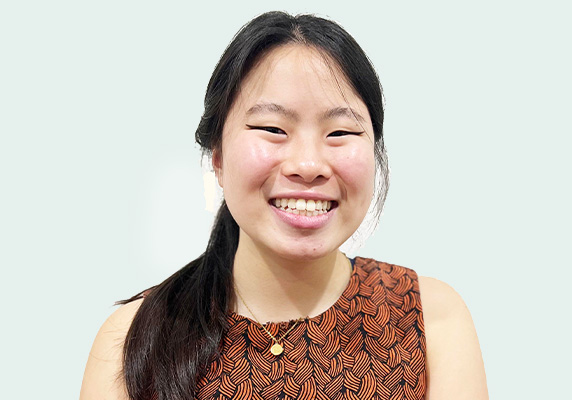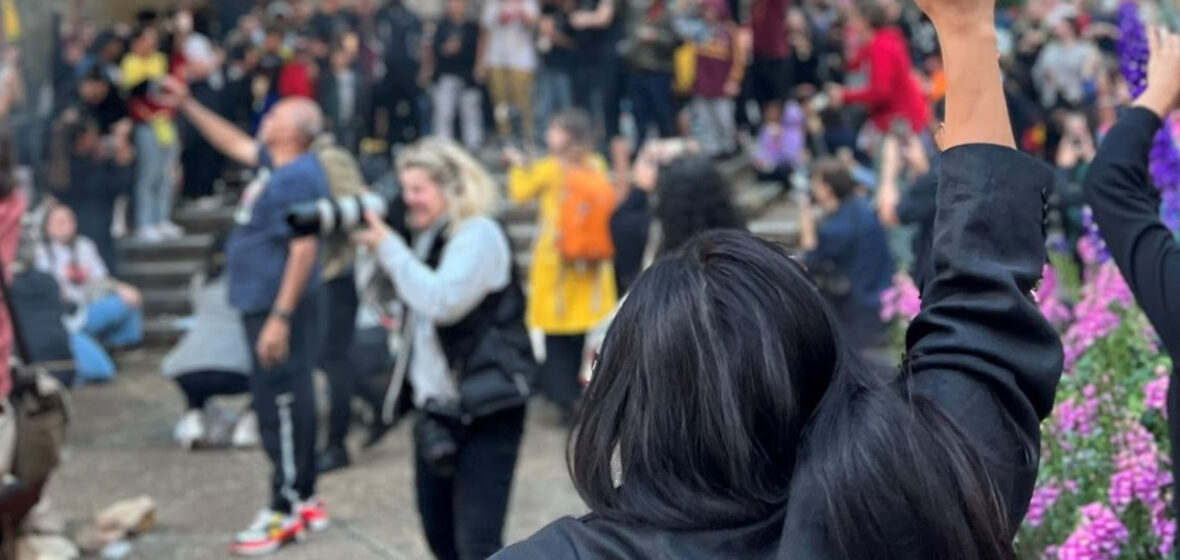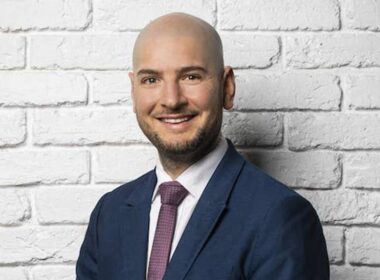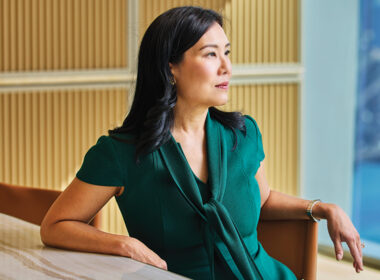Having experienced racism and discrimination in her own personal and professional lives, Sarah Ibrahim is determined to help ensure other people of colour, particularly women, have equitable access to the “fair go” other Australians claim as a given. In establishing the Racial Justice Centre a little more than a year ago, Ibrahim – a commercial lawyer with extensive experience in human rights advocacy – is on a mission to “make the invisible visible”. And she needs your help.
Imagine being denied career opportunities because of the colour of your skin; having to work harder for less pay than your colleagues simply because you don’t look like they do. Imagine your access to services being determined by your racial profile and the quality of those services depending largely on assumptions made about your ethnicity.
Sarah Ibrahim doesn’t have to imagine. The Egyptian-born commercial and human rights lawyer knows exactly how it feels.
But unlike many who suffer the often-silent indignity of racism and discrimination in both their personal and professional lives, Ibrahim has fought long and hard to be in a position from which to tackle the beast head on.
It was bitter lived experience that gave the forthright legal practitioner a burning visceral motivation to establish the Racial Justice Centre, with the goal of shedding light on a reality faced by too many Australians, particularly women, when it comes to racial equality.
Having spent a decade in the social justice space as a human rights lawyer, Ibrahim was also acutely aware of a “huge gap” in access to community legal services for what she calls the “missing middle”.
“If you’re not working at all, you can get access to community legal services. If you’re earning some income, you can go to private practices where they charge between $400-800 an hour for their time.”
This, she says, puts those services beyond the reach of most, and while the community legal sector in NSW caters to a raft of other issues of equal rights – there are centres specifically for LGBTQI+, HIV, elder, disability and women’s rights – in terms of a protected category, there was no community legal centre focused explicitly on racial justice.
Enter the Racial Justice Centre (RJC), the first of its kind in Australia, spearheaded by Ibrahim and powered by a band of like-minded and equally dedicated volunteers.
Incorporated in June 2022, Ibrahim says the decision to incorporate as a community legal service allows the RJC to create different cost models for clients. Some of the centre’s work is offered pro-bono, some “low bono”, enabling the client to pay for the service or come to a traditional cost agreement in the event they win their case and are awarded money.
I’m very determined to make the invisible visible.
– RJC founder and executive director
Ibrahim is eager for her colleagues in the legal fraternity to understand that race is still “very much an issue”.
“If anything, post [the unsuccessful Voice to Parliament referendum], we have seen race as more of an issue than it has ever been in our recent history,” she says, adding that overt racism is not necessarily the most insidious or harmful for those at whom it’s targeted.
“In scholarship they talk about a racialisation process and it’s being used more and more recently, this idea about being re-racialised. When you look at data, you can see the way society is stratified is still in relation to race. Race is still determining how far people careers are getting, it’s limiting what access to justice looks like when they interact with government services, including the justice system and the police. It’s still determining the quality of their services when they’re unwell and they need health services.”
Ibrahim draws on her own experience of domestic violence abuse to explain why covert discrimination is so powerful. Physical hurt, she says, is often less damaging than emotional.
“I remember thinking, “I wish you would just beat me up instead of playing the psychological power and control games where I was psychologically worn down and abused and told all sorts of things and mind games are being played and you’re being gas lit.
“That’s what it’s like to be treated differently, especially when gender intersects, and this is particularly (true) when we look at what we now call women of colour or Aboriginal women,” Ibrahim explains, pointing to employment data showing culturally diverse women earn less than both culturally diverse men and non-culturally diverse staff.
In her own experience in the legal profession, Ibrahim cites previously being excluded and overlooked, considered “problematic” and having her authority diminished, to illustrate the subtle but deeply painful manifestation of covert discrimination which she says makes speaking up all the harder for people who fear being branded a troublemaker.
When the racism is not obvious, it’s hard to define and harder to show. It’s invisible.
“And I’m very determined to make the invisible visible.”

Charmaine Grant knows all about invisibility. The RJC’s volunteer operations manager is Aboriginal – her father Indigenous, her mother from a migrant background – and says that being light-skinned has often left her in something of a racial twilight zone.
“I’ve had experience dealing with racism and discrimination that comes with the privilege of passing as white because I have light skin, as do a lot of Aboriginal people in Australia.
“Growing up and not being white enough, not being black enough, it does come with a feeling of not belonging anywhere. There’s a confusion,” Grant says with emotion cracking her voice. “People feel they can tell you what you are and aren’t – you’re not black, you’re not white. It’s a different journey. And people do drop their guard and say racist things because they don’t think you’re Aboriginal or they think it’s okay.”
This lived experience and a devotion to the pursuit of equity and justice brought Grant to the RJC fold after Ibrahim’s story resonated with her own.
“I’d heard about some of (my parents’) experiences and had some of my own, and I saw that there was no community legal service available for those experiencing racial discrimination, or injustice.
“The purpose (of the RJC) really spoke to me, and I wanted to contribute positively to help towards the goal of eliminating and educating about racism in Australia,” says the passionate volunteer who works as a senior manager in operations for a sustainability engineering consultancy firm when not overseeing the RJC’s operations.
“I’m not a lawyer – my expertise is looking at the strategic plan and the purpose and then operationalising that so we can meet some of the centre’s goals.
“If I can do anything to help push forward the missions of educating and helping others litigate towards eliminating racism, I’m doing something positive. It feels good.
“Even though I’m in a place of privilege, I don’t want others to have to feel the way I felt, especially after the Voice (referendum) – there was so much racism and division. I want to move towards something that is about collaboration and education. I want us all to be able to work together to end racial injustice and discrimination.”
Even though I’m in a place of privilege, I don’t want others to have to feel the way I felt, especially after the Voice (referendum) – there was so much racism and division.
– RJC Volunteer operations manager Charmaine Grant
Similarly motivated by a consciousness of racial discrimination, RJC volunteer paralegal Olivia Lam brings yet another perspective to the fledgling community legal service. Australian-born to Chinese parents, Lam spent her formative years in the United States, and applies an international lens to her observations.
Her interest in racial equality was sparked by the experience of primary and secondary schooling in the US, where issues of discrimination, income inequality and diversity were “background noise and discourse” that felt close to home for the young Lam.
“My passion intensified when I moved back to Australia. When I started at a particular high school in Sydney, I quickly caught on to very dramatic and automatic divisions between students of different races. There seems to be a general indifference as to how race operates to disadvantage some and advantage others.”
Along with her pursuit of a double degree in Law and American Studies at the University of Sydney, Lam works casually as a paralegal at a boutique commercial law firm but still finds time to offer her services to the RJC, such is her devotion to the cause.
Although Lam’s life experiences are mercifully, by her own reckoning, “free of overt instances of discrimination”, it’s what she’s seen as the impact of racism on people close to her that drives her to contribute to the RJC’s mission.
“Something switched on my mentality about how people view others differently based on unspoken assumptions about their race.”
So, what are her observations about the difference between Australian and American societies when it comes to racism? Or is a racist a racist regardless of on which continent they exist?
“It’s a great question, and I think there are distinct differences between the two countries. The discourse in Australia is much less informed about the nuances of race discrimination. This idea of labelling people as racists is not as nuanced. There’s much less awareness around covert racism. Overt racism being you make a very explicit racial slur or you say something that can be quickly identified as discrimination. Whereas covert racism is something that’s more systemic in, say, the workplace or at school.”
For Lam, the quest for informed discourse is part of the RJC’s raison d’etre – to inform the conversation more widely through advocacy.
“While our main strategic location being cases brought to the court for individual persons who have experienced race discrimination, all this has a very important impact in creating community education and raising awareness about issues that are often swept under the rug or deemed too taboo or too uncomfortable to even talk about,” says Lam, adding that the RJC also works towards law reform and is planning to bring different stakeholders together from within the industry and from grassroots organisations and the community to help inform and make representations to government about issues of racial justice.
“That’s really important, particularly in the wake of the referendum. We’ve noticed in the fallout a strong separation between racism experienced by First Nations people versus the wider racialised community. Those two groups don’t really see their experiences as linked in any way.”
It’s a chasm, Lam says, that obscures common ground and “the potential for deep sympathetic identification between those two groups” and identifies a role for the RJC in stepping in to address this “blind spot in political coalition building”.
Again, Lam draws on her experience in the United States to illustrate her point. There, she says, there are groups such as the “Blasian” protest group which sees Black and Asian-Americans coming together to recognise and address their shared experience.
“Because the staff at RJC are quite diverse, it attracts people from different racial minorities, and you get that sort of coalition building in the centre itself. The partnerships RJC is planning to create across different sectors of society will result in political coalition building. That sort of awareness is important.”

Along with awareness of racial injustice and discrimination is a need for practical reform, including the expenditure of resources, according to RJC founder and executive director Ibrahim.
It’s not enough, she says, to simply be aware. Structural legislative change requires the injection of cold, hard cash if they are to be effective, and the RJC is hoping to affect such reform through its advocacy to government.
“If I say racism is an ongoing issue in Australia that’s being lived out and impacted in so many facets of everyone’s lives, but there are no resources put in…” Ibrahim says, letting the thought’s conclusion form itself before offering “a most basic example”.
“The legislation says you must hold data on the number of women in your company if it has more than 100 people. Why is there no requirement in the law for data on the racial composition of your workplace?
“In the UK, the actual empire itself does a better job at this. They are required to keep statistical data (on racial composition of workplaces). They have data points which you can then analyse. It’s very hard if you’re not required by law to keep the data. That makes the racism structural – it’s in the structure.”
Addressing this structural change, Ibrahim says with the benefit of also having studied economics, requires incentivisation.
“There needs to be an economic cost to the experience and the law to help create one. That’s about changing hearts and minds, but it doesn’t come about without a huge education campaign around how racism happens – how its’ structural, how it’s encoded in the law to have particular outcomes that look neutral but may not be. It’s about making that invisible visible, making sure the market knows it’s expensive for this behaviour (to continue), so it then needs to course correct.”
The RJC’s founder is also determined to advocate for what she calls “a positive duty towards racial equality” in an Australia where we value racial diversity rather than seeing it as a “problem” to be solved.
Part of the centre’s mission, under Ibrahim’s guidance, is to advocate for a society in which Aboriginal people, for instance, are not just spoken about “in deficit terms”.
“Where we think about the amazing contribution of the longest living culture and think of them as the knowledge holders who we would be so lucky to hear from and be guided by. To think about them as powerful First Nations Australians.”

It’s impossible to argue against the value of the Racial Justice Centre’s mission, but empathy with and support for its principles alone won’t affect change.
“We really need pro bono private law firms to collaborate with us because we think anti-racism is a collective effort,” is the plea from Ibrahim and her fellow volunteers. “We need everybody to get on board with the idea of working towards an Australia that does recognise racial equality and fights for it through an anti-racism lens.”
This support can be offered in several ways – through in-kind support and secondments as well as through straight donations towards the centre’s operational costs.
“Legal practitioners are knowledge holders,” says Ibrahim. “They all have a role to play. The service has been offering people advice across Australia and we have volunteers in most states around Australia helping us.”
Both Grant and Lam join with their mentor in encouraging others who believe in the principles of racial justice to take up figurative arms in the fight against race discrimination.
For Lam, one of the most rewarding elements of her voluntary contribution at the RJC is “being able to represent the interests of those who are often relegated to statistics or anonymous as some sort of social group”.
“I have the immense privilege of helping people to have a voice in areas public life that they would not otherwise have,” she says. “Whether that’s because no-one will listen or because the system is not designed to be accessible, or because oftentimes they don’t have the emotional or other capacity to speak due to what they’ve gone through.”
Lam says she’s gained “a world of insight into both legal practice and social justice work” through her short time at RJC, her first hands-on practical legal experience and it’s an experience she would encourage other fledgling lawyers to explore.
“It’s opened my eyes, not only to the day-to-day normal challenges of, for example, going to court, but also what it’s like to work in an area where justice often is not a given.
“What I’ve learned from working with Sarah is that where there are a lot of rigid laws and conventions of applying those laws in an area that’s not well captured by existing legislation, we have to be very creative in the way we construct arguments. It’s extremely exciting and enriching for us as young aspiring lawyers or law students.”
And for those whose expertise lies outside the legal field, volunteering at RJC can be just as rewarding, according to RJC operations manager Grant.
“It’s a small part of my time, but it’s one of my favourite parts of the week. Being able to contribute to such a great purpose energises me and to see it moving forward is just a great feeling,” says Grant. “I wish others could feel that as well.”




